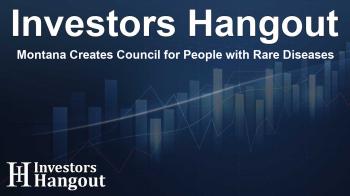Montana Creates Council for People with Rare Diseases

Montana Creates Council for People with Rare Diseases
The National Organization for Rare Disorders (NORD) is celebrating a significant milestone with Montana becoming the 32nd state to form a dedicated Rare Disease Advisory Council (RDAC). This initiative, which was propelled by House Bill 943, was signed into law, marking a progressive step towards addressing the needs of individuals living with rare diseases. The council will comprise 17 members who will focus on education, guidance, and actionable recommendations to improve policies for Montanans affected by rare conditions.
Importance of the Rare Disease Advisory Council
The establishment of Montana's RDAC underscores the state's commitment to its rare disease community. The swift progression of the bill—from introduction to government approval in just over a month—illustrates a collective understanding of the urgency in addressing the challenges faced by those with rare conditions. With over 30 million Americans living with 10,000 different rare diseases, this council will be pivotal in advocating for their voices in challenging policy discussions.
A Voice for Patients
RDACs serve as a critical platform where patients can express their concerns and preferences regarding healthcare policies that affect them. According to NORD’s Chief Executive Officer, Pamela K. Gavin, the council will be instrumental in facilitating communication between patients and policymakers, addressing the daunting challenges—such as isolation and emotional distress—that accompany rare disease diagnoses.
Features of the Montana RDAC
Montana's council is distinctive for its inclusion of a representative from the state's public health laboratory, highlighting the essential role of newborn screening in identifying rare diseases early. This collaboration will ensure specialized perspectives are incorporated into the legislative process. Furthermore, the council has reserved specific seats for rare disease patients and their caregivers, allowing those with personal experiences to engage directly in discussions that concern them.
Funding and Resource Allocation
Another noteworthy aspect of Montana's RDAC is its immediate budget allocation of $16,000 from the state government, reflecting a sincere commitment to the council's establishment and functionality. This proactive funding approach is a significant contrast to several other states that have created councils without initial financial backing, ensuring that meaningful progress can be achieved from the outset.
Collaboration with NORD and Advocacy Efforts
NORD's tireless work with grassroots advocates throughout the country aims to promote federal and state policies that directly benefit individuals with rare diseases. By collaborating with numerous patient advocacy organizations, NORD unites the collective voice of the rare disease community, pushing for enhanced access to specialists, affordable healthcare, and necessary medical treatments.
Impact of Rare Disease Challenges
Living with a rare disease can impose considerable financial and emotional burdens on patients and their families. Unlike common diseases, patients often face extended symptoms before obtaining a correct diagnosis, which can take several years. Alarmingly, only 5% of known rare diseases have received Food and Drug Administration (FDA) approval for treatment options. Direct medical costs for rare disease patients tend to be disproportionately higher compared to their peers without a rare condition, making legislative advocacy critical for better healthcare access.
Engaging the Community
Individuals can actively support their local rare disease community by getting involved with NORD's initiatives, which aim to promote awareness and collaborative efforts to address the needs of patients. By participating in advocacy programs, community members contribute to the ongoing dialogue that shapes policy and enhances resources available to those affected by rare diseases.
Frequently Asked Questions
What is the main goal of Montana's Rare Disease Advisory Council?
The primary goal is to provide guidance, education, and recommendations to improve policies and resources for those affected by rare diseases in Montana.
How can individuals get involved with the rare disease community?
Individuals can engage with NORD's advocacy initiatives and support local efforts through community outreach programs tailored for rare disease awareness.
What makes Montana's RDAC unique?
Montana's RDAC includes a public health laboratory representative and ensures that rare disease patients and caregivers have a direct voice in discussions affecting their care.
Why are RDACs important?
RDACs are vital as they provide a platform for patients to voice their concerns and influence healthcare policies that impact their lives.
What challenges do rare disease patients typically face?
Rare disease patients often face prolonged diagnoses, limited treatment options, and higher medical costs compared to those with non-rare diseases.
About The Author
Contact Ryan Hughes privately here. Or send an email with ATTN: Ryan Hughes as the subject to contact@investorshangout.com.
About Investors Hangout
Investors Hangout is a leading online stock forum for financial discussion and learning, offering a wide range of free tools and resources. It draws in traders of all levels, who exchange market knowledge, investigate trading tactics, and keep an eye on industry developments in real time. Featuring financial articles, stock message boards, quotes, charts, company profiles, and live news updates. Through cooperative learning and a wealth of informational resources, it helps users from novices creating their first portfolios to experts honing their techniques. Join Investors Hangout today: https://investorshangout.com/
The content of this article is based on factual, publicly available information and does not represent legal, financial, or investment advice. Investors Hangout does not offer financial advice, and the author is not a licensed financial advisor. Consult a qualified advisor before making any financial or investment decisions based on this article. This article should not be considered advice to purchase, sell, or hold any securities or other investments. If any of the material provided here is inaccurate, please contact us for corrections.

